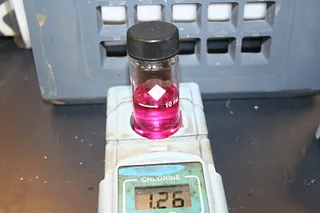I was looking over my water quality report. It gives a number to call with any questions.
I recall from a previous thread, someone suggested to ask if they flush out the mains with higher levels of chlorine or chloramine and if they give notice of this? I think the thread says this is sometimes done after big storms or after water main repair?
My water is Lake Michigan water from Chicago that comes out the suburbs. Chlorine is listed (no mention of chloramine) 1ppm Chicago 0.9 here (I've tested 0.5 with strips but I'm on the fourth floor of a condo). I will ask if they ever use chloramine (on a future tank auto water change, I think I read here it's easier/cheaper to set up a system for only chlorine vs having to treat chloramine).
I've read people mention Nitrate and Nitrite tap levels. It says 0.3 ppm Nitrate detected in Chicago, NA for my city (I guess they don't test it?). Total Nitrate+Nitrite is also 0.3 ppm Chicago , NA my city.
The rest I don't think I've heard mentioned in threads here and I barely understand what they are reading the definition page. (HAAS, barium, etc levels).
Just to summarize, are there any other questions you would ask when calling? Only thing I can think of is what I listed above, asking about higher level flushes with chlorine and asking if chlormine is ever used here).
I recall from a previous thread, someone suggested to ask if they flush out the mains with higher levels of chlorine or chloramine and if they give notice of this? I think the thread says this is sometimes done after big storms or after water main repair?
My water is Lake Michigan water from Chicago that comes out the suburbs. Chlorine is listed (no mention of chloramine) 1ppm Chicago 0.9 here (I've tested 0.5 with strips but I'm on the fourth floor of a condo). I will ask if they ever use chloramine (on a future tank auto water change, I think I read here it's easier/cheaper to set up a system for only chlorine vs having to treat chloramine).
I've read people mention Nitrate and Nitrite tap levels. It says 0.3 ppm Nitrate detected in Chicago, NA for my city (I guess they don't test it?). Total Nitrate+Nitrite is also 0.3 ppm Chicago , NA my city.
The rest I don't think I've heard mentioned in threads here and I barely understand what they are reading the definition page. (HAAS, barium, etc levels).
Just to summarize, are there any other questions you would ask when calling? Only thing I can think of is what I listed above, asking about higher level flushes with chlorine and asking if chlormine is ever used here).





